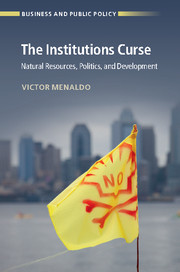Book contents
- Frontmatter
- Dedication
- Contents
- List of figures
- List of maps
- List of tables
- Acknowledgments
- 1 Introduction
- 2 Three puzzles and some building blocks
- 3 Intellectual heritage of the institutions curse view
- 4 The institutions curse theory
- 5 Not manna from heaven after all: the endogeneity of oil
- 6 The resource blessing
- 7 Oil curse or monarchical exceptionalism?
- 8 Conclusions
- References
- Author index
- Subject index
4 - The institutions curse theory
Published online by Cambridge University Press: 05 August 2016
- Frontmatter
- Dedication
- Contents
- List of figures
- List of maps
- List of tables
- Acknowledgments
- 1 Introduction
- 2 Three puzzles and some building blocks
- 3 Intellectual heritage of the institutions curse view
- 4 The institutions curse theory
- 5 Not manna from heaven after all: the endogeneity of oil
- 6 The resource blessing
- 7 Oil curse or monarchical exceptionalism?
- 8 Conclusions
- References
- Author index
- Subject index
Summary
Good institutions provide the means by which individuals can achieve personal security, improve their material welfare, and reach their potentials. Countries blessed by their institutions experience consistent economic growth and, in some cases, egalitarianism. The result is development in every sense of the word: liberal democracy, prosperity, and social flourishing.
Several channels help to link good institutions to these outcomes. They include the rule of law and checks and balances; honest and professional bureaucracies; economic policies that reduce transaction costs and foster competition; and the widespread provision of public goods. If these things are present, citizens tend to feel good about their personal safety and the safety of their investments, and enjoy greater economic opportunities. They will tend to trust each other and their governments, cooperate, and make continued investments in physical and human capital. The collective result is enduring political and economic development.
We can use logical inference to deduce the vicissitudes of the institutions curse. Countries are cursed by their institutions when the rules of the game, and the shared beliefs and expectations that underpin those rules, produce outcomes that harm the majority of the population, if not portions of the ruling class. Citizens are forced to navigate between the Scylla of government predation and repression and the Charybdis of citizen-on-citizen predation and crime. Elites face a different, if not deadlier, set of challenges: coups, purges, show trials, and revolutions. The upshot is political and economic underdevelopment as trust, cooperation, and investments that promote productivity remain stillborn.
These insights, all inspired by neo-institutionalist political economy, suggest an important puzzle. If institutions are the key to development broadly understood, then why don't all societies simply adopt good institutions? Why are the rule of law and liberal democracy not universal? Why are corruption, cronyism, and despotism – and thus underdevelopment – still so pervasive?
They also raise some tangible questions. Why did the initial emergence of private property rights, liberalism, and democracy take place in Western Europe – not in Central Asia or Sub-Saharan Africa? Why did these countries become more inclusive and egalitarian over time? Why was it possible to recreate Western Europe's institutions in some places and not others? Why did liberalism and democracy flourish in Canada, the United States, and Australia, for example, but failed to emerge in Tanzania and Jordan?
- Type
- Chapter
- Information
- The Institutions CurseNatural Resources, Politics, and Development, pp. 77 - 130Publisher: Cambridge University PressPrint publication year: 2016

